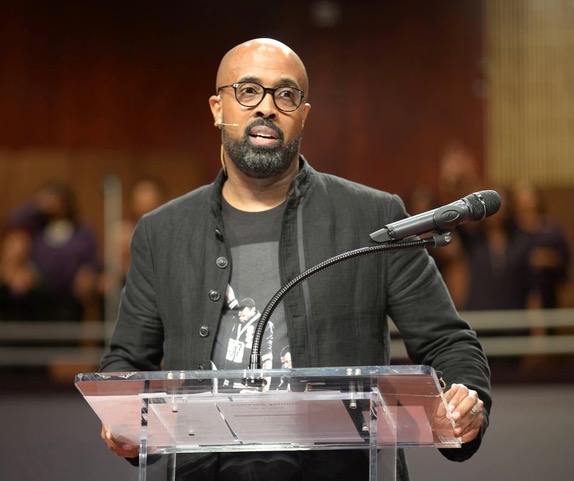
The Reverend Jesse Jackson announced right before the Rainbow Push 57th Annual Convention that he was going to “pivot.” Meaning that his day-to-day role at RAINBOW PUSH would change, and the power reigns are handed to Dr. Frederick Douglas Haynes of Friendship-West Baptist Church in Dallas, Texas. We wait for the next steps of the civil rights movement. Haynes is a perfect choice as he advocates, preaches, and teaches with doctoral authority about America’s social injustices with an African American pastoral voice. The Civil Rights Movement reaches a new pilgrimage in the historical moment. We have not seen a senior civil rights leader with succession. We have experienced too many funerals.
Rev. Jackson’s social justice career started accidentally. As a college student, he went to the public library in Greenville, South Carolina to check out a book and couldn’t because he was Black. He protested and changed the ruling. A leader was born. Jackson says much of his work begins with an “insult.” He proved to have a “high insult level.”
Jackson has marched probably more than any other for social justice. His marches have been around the world. He was there when he saw the social ills develop and lent his voice, name, and feet to inequities. His hallmark is his fight for justice, equity, diversity, and freedom. He considers himself, most of all, a “freedom fighter.” When Jackson visited South Africa, Nelson Mandela wanted to meet a fellow freedom fighter. He invited Jackson to his home.
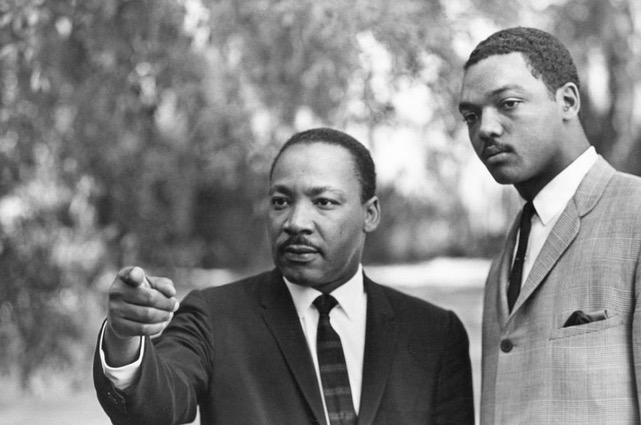
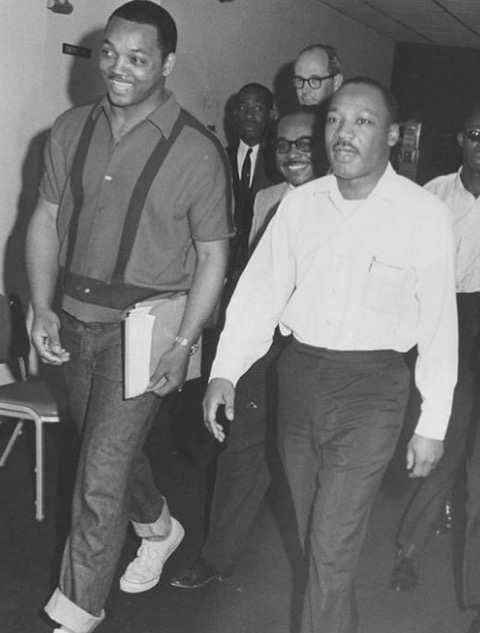
Jackson continued Dr. King’s work. King assigned him to Operation Breadbasket, then the economic arm of the Southern Christian Leadership Conference (SCLC). He was a doctoral student, a seminarian, at Chicago Theological Seminary. Along with Reverends David Wallace and Gary Massoni, they were the founders of the Chicago chapter. They even took a professor with them, Dr. Alvin Pitcher, a professor of Ethics at CTS.
A movement was born. Change in leadership was mounting. The men in jeans were in the streets with Bibles, talking a new talk, walking, and marching. The old guard resisted. Young, unapologetic men saw the gospel in a new way. Influenced by King’s social activism David and Jesse dropped out of school to join King in the historic March on Selma in 1965 for the right to vote. On that same day, Jacqueline Jackson, was in Chicago giving birth to Jesse Jackson, Jr., Gary finished school. Jesse and David would eventually receive their doctorate degrees for work completed external to theology school years later.
The Jackson Way
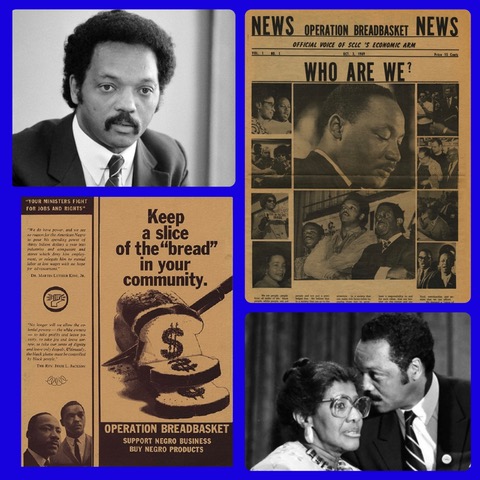
Jackson held weekly meetings on Saturday mornings at the Parkway Ballroom with shared offices on 47th and South Park (now known as King Drive). After King’s death, the meetings exploded, and the meetings moved to local churches, to the Capital Theater, and eventually its permanent home, King’s Workshop, 930 East 50th Street.
The crowds grew to hear Jesse speak, preach and give marching orders for the week. Marching orders might have been political or boycott aimed. Entertainers came from out of town for the Saturday morning meetings. Among them, Bill Cosby, Aretha Franklin, Cannonball Adderley, Jerry Butler, Gladys Knight and Robert Culp. The crowds grew, and The Breadbasket Choir and band were on fire under the leadership of Ben Branch with the blues guitar of Wayne Bennett and the sexy saxophone of Gene Barge and the choir voices of Sue Conway, Eric Thomas and Lois Scott. They were all professional entertainers who often stayed up late on Fridays to be at Breadbasket on Saturday mornings.
The late Reverend Willie Barrow, a Jackson aide, ran the consumer division where she organized women as though they were a protest army. She liked to say, “This is the movement that made Jesse look at the White House.”
Black Expo/Black Excellence…
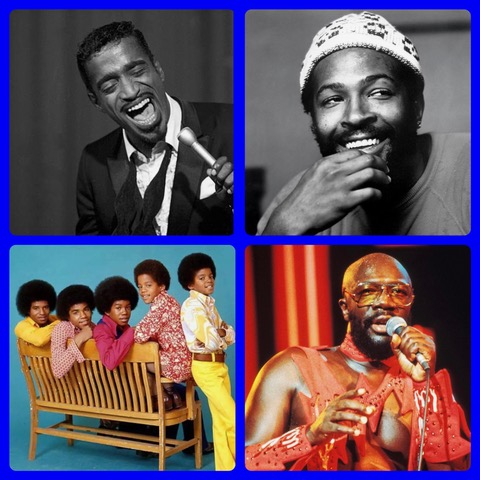
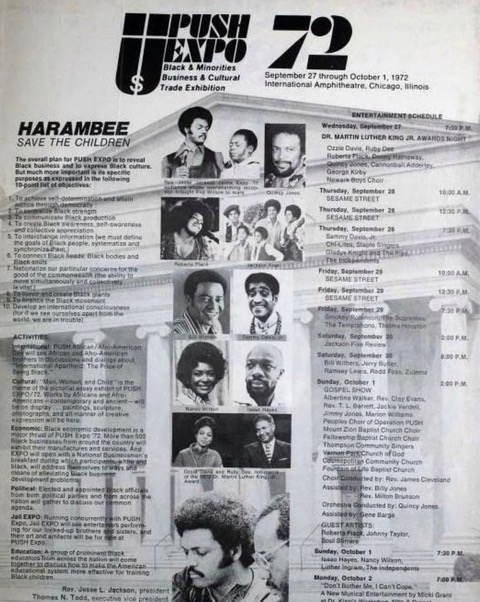
Jesse came up with innovative ideas to showcase Black Americans in the mainstream. He put on a Black Expo at the International Amphitheater, a showcase of Black Excellence. Expo was financed by local businessmen and lead by Richard Thomas.
I was the Cultural Chair. Pete Long of the Apollo Theater and Quincy Jones ran the entertainment stage. I was their assistant and fell in love with producing shows.
Expo introduced a boy named Michael with his brothers on a Saturday matinee to screaming tweens and teens. A brand new show for children on PBS was introduced in the name of Sesame Street and Big Bird. An embarrassed Sammy Davis sang “My Way” like no other, and boos turned into a warm hug from Jesse. Sammy had just left the White House, hugging President Richard Nixon to only meet rejection and public embarrassment Issac Hayes introduced himself to screaming women as Black Moses. And Marvin Gaye sang probably every song he knew until the wee small morning hours.
Major exhibits highlighted business, entertainment, and culture. To date, it remains the largest Black exposition of Black folk ever. A movement was moving. Some of the booth owners became genuine business owners like jeweler, Eddie Ford.
Jesse continued the work of Dr. King as an activist. Others followed the King’s path into electoral politics. Jackson remained an external force pulling and pushing the main and fighting the power structure. He was effective as he was producing social change. The presidential candidates of both parties sought his advice and most of all his endorsement. He used the opportunity to negotiate. I remember the day Nelson Rockefeller came to the offices on 47th Street to speak with Jesse.
Run Jesse Run!
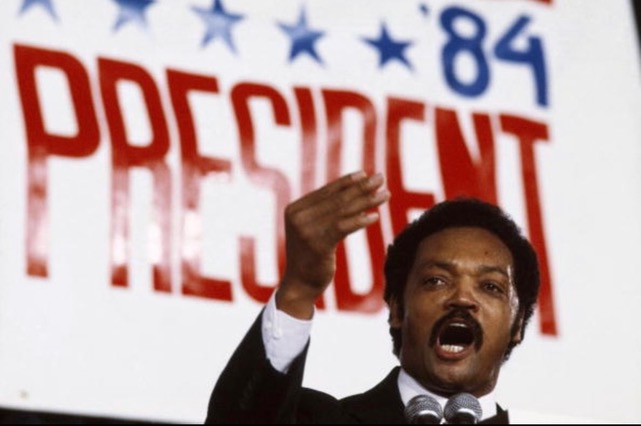
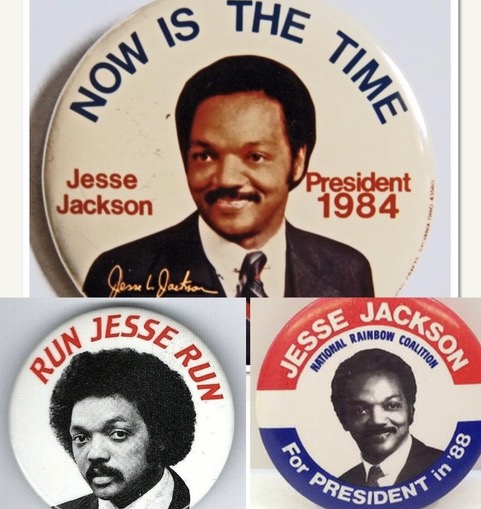
And then, in 1984, a political analytical white paper written by the late Frank Watkins demonstrated the numbers and dynamic of the southern Black vote. Jackson said we could win the presidency. He sought to get a Black presidential candidate. He asked Mayor, Congressman, and Ambassador Andrew Young to consider being a candidate. He asked Maynard Jackson, former Mayor of Atlanta, to run, sharing the ideology with demonstrated numbers to consider the possibility of running for the highest office in the land. They both said NO.
Jackson saw an opportunity to exercise collective power. He decided to take the task on. When he ran in 1988, he changed and challenged the democratic party. He modernized it. He equalized a new count formula, “Winner takes all.” The gesture altered the course of history, and Bill Clinton won. Barack Obama won with the Jackson strategy. The rest is history. As he has campaigned around the country for candidates from councilmen to Presidents, the face of history changed the nation.His power was he could galvanize a community with preaching and teaching. His campaigning has always included voter registration. He has registered more voters than any other single man in American history. The late Dr. Charles Ogletree, Law Professor at Harvard University, reports the newly registered voters for Jackson at 6 million.
Mentored Barack Obama…
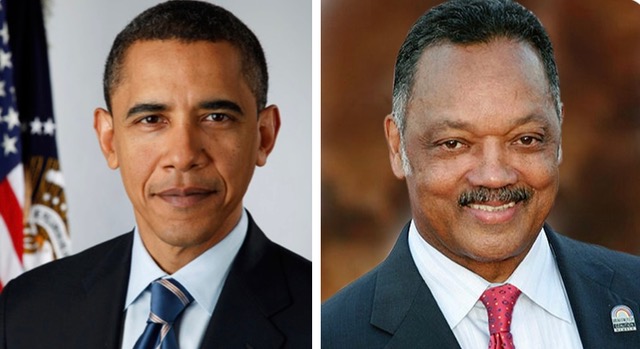
Historical credit is given to Jackson for leading the pathway for Obama, but it is much more intimate than the pathway. I took a young budding Barack Obama to meet with Jackson one Saturday morning. They had never met face to face, and I thought they should know each other. I asked Jackson to groom him and hold a discussion on national and international affairs. Jackson asked me, point blank, what is your interest? I said he is a bright young man with a promising future. He agreed and took it another step further. He offered Obama a position on the PUSH stage every Saturday to provide a report on the happenings in Springfield. This is the stage where Obama gained his speaking prowess. He spoke regularly and met with Jackson at 8 am on Saturday mornings for a solid year. This is too often overlooked but indeed not forgotten. It was a major step in the development of Obama, who never invited Jackson to the White House.
Jesse The Activist…
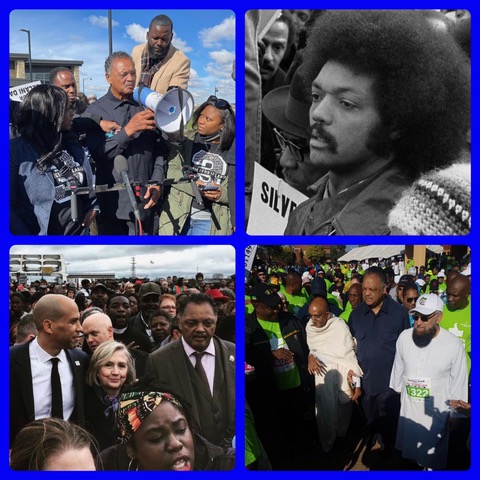
Jackson became the Supreme Activist. So much so that other countries recognized his good deeds, and he received the highest civilian honor in the United States, France, African Nations, South Africa, and Costa Rica. He has traveled the world with rescue missions as a private citizen rescuing captive Americans, where he worked as an unsigned diplomat.
He continued King’s work. King contested and challenged America’s constitution moving Black America out of second-class citizenship into full rights as human beings. His Baptist preacher sermons and his marches confronted America’s racism. He was killed because of it and harassed by the American government. He is also an American father, so writes Jonathan Eig in his new biography of King.
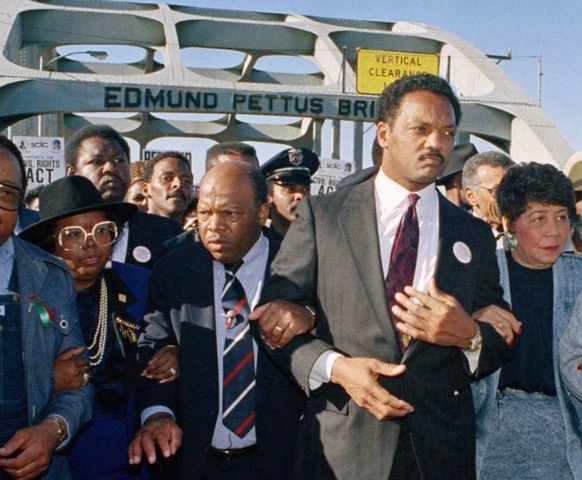
Jackson altered the caste system in America. He transitioned from Breadbasket boycotts to Wall Street. Along with Congressman John Lewis, he honored the Selma march annually. He is one of the country’s best orators with a bold, hip preacher style. His speech at the Democratic National Convention is legendary. We listened as he spoke. He woke America with a historical and futuristic message. The Democratic party was nervous about the Jackson speech, and there was much behind-the-scenes discussion on what time he would address the convention. Prime time became a real issue. He has marched both with the crowd and alone. He received harsh criticism when he marched on Hollywood demanding equity at the Academy Awards. He marched with few and was harshly criticized.
In 1984, there were 15,000 Black elected politicians. The Black political forum grew to today’s 30,000. Many ask, “Is the civil rights movement in 2023?” As the Supreme Court turns the clock back on affirmative action, diversity, and equity officers are fired from their corporate jobs, and White people opt to rewrite history and ban literature from schools, we are witnessing a misreading of the past. The civil rights movement is as relevant today as it was after the Emmitt Till murder. The inequities and injustices still exist, and Black men are under police attack. The country is developing a new “Black Code.”
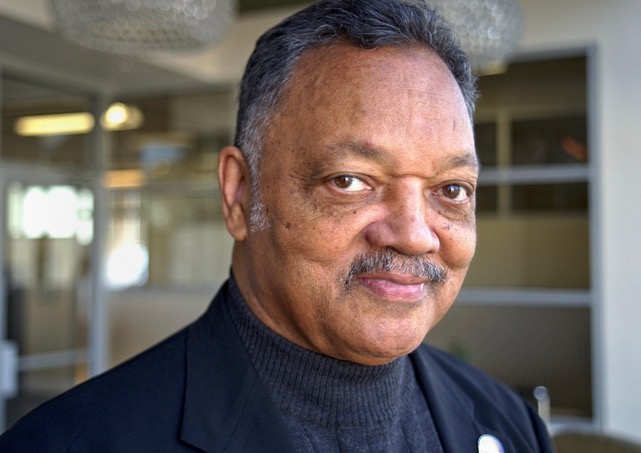
Jackson’s voice is required, and the work continues. Many people have benefited from his mentoring. He deserves a debt of appreciation from Black America. He pushed back. He won. He improved life in America.
He is one of the ones who proved one person can make a difference. As the major press attempts to write about his complexities and make judgments, actually, he is simple. He addressed America’s racism, played his game, and led his actions like a smart quarterback, weaving, scoring, and dodging like a football player.
He and his wife Jacqueline have two sons to serve as United States Congressmen, both serving the South Side of Chicago. No other Black family can make such a claim.
He has done it all as a private citizen. Stay woke and keep hope alive.

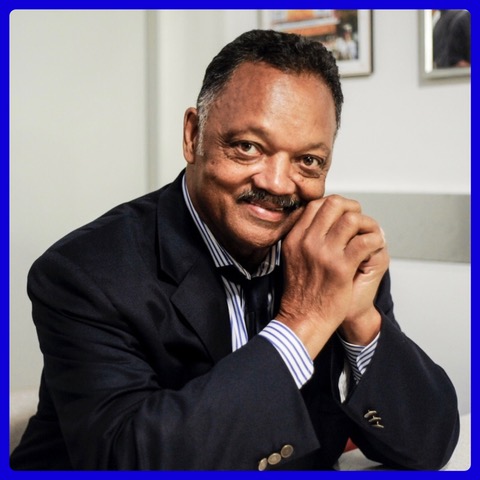

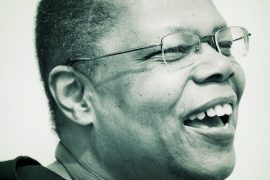

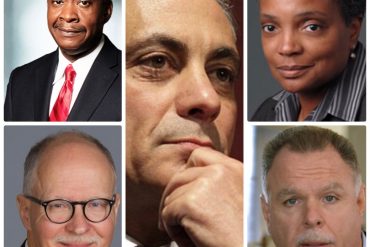
2 Comments